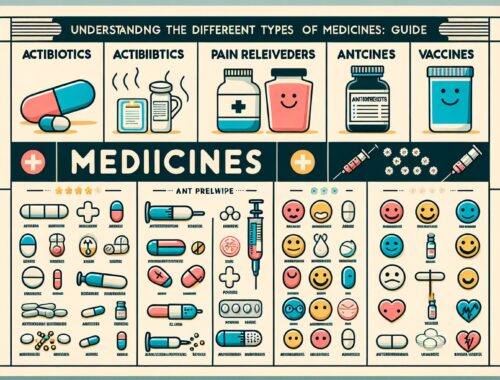
The Different Types of Medicines
Medicines play a crucial role in our lives, helping us combat various illnesses and improve our overall well-being. With advancements in medical science, different types of medicines have been developed to target specific conditions. In this article, we will explore the various types of medicines available today.
Introduction
Medicines are substances designed to treat, cure, or prevent diseases. They come in different forms such as tablets, capsules, liquids, injections, and topical creams. These medications contain active ingredients that interact with our bodies to produce therapeutic effects. Let’s delve into the different types of medicines and understand how they function.
1. Analgesics
Analgesics, commonly known as painkillers, are drugs used to alleviate pain. They can be further classified into non-opioid analgesics, opioids, and adjuvant analgesics. Non-opioid analgesics, like ibuprofen and acetaminophen, relieve mild to moderate pain, while opioids, such as morphine, are prescribed for severe pain. Adjuvant analgesics help enhance the effects of other pain relievers.
2. Antibiotics
Antibiotics are medications used to treat bacterial infections. They work by either killing the bacteria or inhibiting their growth, allowing the body’s immune system to fight off the infection more effectively. Some commonly used antibiotics include penicillin, erythromycin, and tetracycline. It is important to note that antibiotics do not treat viral infections such as the common cold or flu.
3. Antidepressants
Antidepressants are prescribed to individuals suffering from depression, anxiety disorders, or other mental health conditions. These medications work by balancing certain chemicals in the brain, known as neurotransmitters, which are responsible for mood regulation. There are different types of antidepressants, including selective serotonin reuptake inhibitors (SSRIs), serotonin-norepinephrine reuptake inhibitors (SNRIs), and tricyclic antidepressants (TCAs).
4. Antihistamines
Antihistamines are commonly used to relieve allergy symptoms, such as sneezing, itching, and watery eyes. These medications work by blocking the effects of histamine, a chemical released by the immune system in response to allergens. Antihistamines can be classified into sedating and non-sedating types, with sedating antihistamines often causing drowsiness.
5. Antacids
Antacids are medicines used to neutralize stomach acid and provide relief from conditions like heartburn, acidity, and indigestion. They work by increasing the pH level in the stomach, reducing the discomfort caused by excess acid. Calcium carbonate, magnesium hydroxide, and aluminum hydroxide are common types of antacids available over the counter.
Conclusion
Medicines are indispensable tools in modern healthcare, aiding in the treatment of various ailments. From pain relief to combatting infections and managing mental health conditions, different types of medicines target specific needs. It is crucial to understand their purpose and follow healthcare professionals’ guidance when using them. Consulting a healthcare provider is always recommended to ensure safe and effective usage of medications. Remember, medicines should only be taken as prescribed or recommended by a healthcare professional in order to reap their full benefits and minimize any potential risks.
You May Also Like

Understanding the Different Types of Medicines: A Guide
January 8, 2024
Exploring the Different Types of Medicines
February 22, 2024

